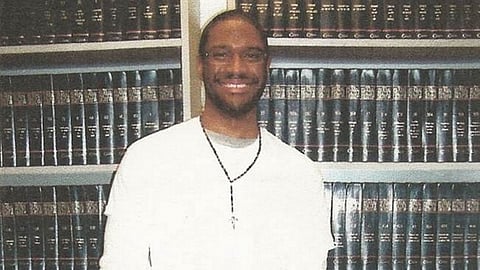

BRANDON Bernard is the youngest offender to be executed by the federal government in nearly 70 years. Aged 40 years old, he was pronounced dead at 21:27 local time on Thursday at a penitentiary in the city of Terre Haute.
Bernard was convicted for his involvement in the double murder of Todd and Stacie Bagley in 1999. at the time, Bernard was 18 years old. He was one of five teenagers accused of robbing the pair and forcing them into the boot of their car in Texas.
Bernard's last words were directed to the family of the couple he killed. He told the family that he was sorry, before dying by lethal injection.
He took part in what was supposed to be the robbery of youth ministers Todd and Stacie Bagley. Brandon and another teenager, Terry Brown, split from the group as three accomplices decided to carjack the Bagleys and lock them in their trunk in Texas.
“Five of the sentencing jurors came forward saying that if they had been aware of the undisclosed information, they would not have agreed to sentence Bernard to death.
The group's leader, Christopher Vialva, insisted that the couple needed to be killed, and shot them. Brandon and Terry were told to get rid of the evidence and doused the car with lighter fluid.
Christopher Vialva was executed in September. Terry and Christopher Lewis, have already been released from prison. Tony Sparks will be released in 2030.
The defence lawyers claimed that both the Bagleys probably died before the car was set on fire. An independent investigator hired by the defence said Stacie had been "medically dead" before the fire. However, government testimony during the trial said that although Todd Bagley had died instantly, Stacie had had soot in her airway, signalling that she had died from smoke inhalation and not the gunshot wound.
Bernard's lawyers argued that he should be given life in prison without parole. Throughout his time in jail, he maintained a good record and worked with outreach programmes to stop people from getting involved in crime.
Five of the sentencing jurors came forward saying that if they had been aware of the undisclosed information, they would not have agreed to sentence Bernard to death.
At the heart of the defence's case are three arguments.
One, that in the original plan Bernard was only a "getaway driver", according to Owen. Two, that a former warden from the federal Bureau of Prisons said Bernard should be commuted because of his good conduct during his 20 years in prison. And three, that five of the nine jurors who handed Bernard his death sentence have since come forward to say that they regret the original verdict.
Despite many pleas for clemency, Brandon's execution has been carried out. The Supreme Court denied a last-minute stay of execution.
A lower court judge denied Bernard's motion to stay the execution. The 7th Circuit Court of Appeals denied an emergency motion and the US Court of Appeals for the District of Columbia Circuit also denied the appeal, according to court documents.
Attorneys Alan Dershowitz and Ken Starr joined Bernard's legal team late on Thursday and had filed a petition with the Supreme Court requesting to delay the execution for two weeks so they could get up to speed on Bernard's case.
“In her dissent, Justice Sonia Sotomayor argued that if the prosecution had not withheld the evidence and knowingly elicited false testimony, as Mr. Bernard claimed, there is reasonable probability that he would not have been sentenced to death.
The Supreme Court denied the petition, with three justices issuing public dissents.
In her dissent, Justice Sonia Sotomayor argued that if the prosecution had not withheld the evidence and knowingly elicited false testimony, as Mr. Bernard claimed, there is reasonable probability that he would not have been sentenced to death. She also contended that an appeals court that denied Mr. Bernard's motion in a case related to the testimony "got it wrong," and required too strict a standard that "perversely rewards the government for keeping exculpatory information secret."
The court's decision left Trump as Bernard's last hope.
Trump was made aware of the case and of the calls by celebrities and activists to commute Bernard's sentence however he did not act.
Bernard became the ninth federal execution of 2020, ever since the Trump administration reinstated federal executions in July after a 17-year moratorium. Brandon's execution also became the first to happen during a presidential lame-duck period in 130 years.
Trump still has four more federal executions scheduled to take place before President-Elect Joe Biden is sworn in on Jan. 20, 2021.
(Nilakshi Srivastava is currently pursuing IV Year of B.A. LL.B. (Hons.) at National Law Institute University (NLIU), Bhopal.)